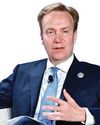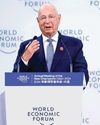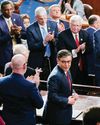
IN THE OFFICE OF ANDRIY Smyrnov, the deputy head of Ukraine’s presidential administration, the wanted posters spread across the desk serve as a kind of mission statement. They show the faces of five Russian officials, led by President Vladimir Putin, next to a list of the charges Ukraine has leveled against them: aggression, war crimes, crimes against humanity. “We had these printed as a reminder,” Smyrnov says while pacing around his desk on the third floor of the presidential compound, one floor down from the chambers of his boss, President Volodymyr Zelensky. “There’s no alternative to putting Putin on trial,” he says.
The question is where, and under whose authority. As the top aide to Zelensky on judicial matters, Smyrnov, 42, has spent the past year charting a path to an improbable destination: a courtroom, somewhere, with Putin in the dock. Every step has been painstaking, with Ukraine’s closest allies often blocking the way. But Smyrnov, who has no experience in international law, has made surprising progress. Last fall, he says, “nobody even wanted to talk to us about a tribunal. Now look at how quickly the civilized world is waking up.”
On March 16, investigators working with the U.N. Human Rights Office reported that Russian forces had committed crimes against humanity, a rare rebuke from a U.N. body against a sitting member of the U.N. Security Council. The following day, the International Criminal Court in the Hague (ICC) issued a warrant for Putin’s arrest, charging him in connection with another alleged war crime: the mass deportation of Ukrainian children to Russia. Less than two weeks after that, the U.S. set out a plan to put Putin on trial for the crime of aggression, which some scholars describe as the root of all war crimes.
This story is from the April 10 - 17, 2023 (Double Issue) edition of Time.
Start your 7-day Magzter GOLD free trial to access thousands of curated premium stories, and 9,000+ magazines and newspapers.
Already a subscriber ? Sign In
This story is from the April 10 - 17, 2023 (Double Issue) edition of Time.
Start your 7-day Magzter GOLD free trial to access thousands of curated premium stories, and 9,000+ magazines and newspapers.
Already a subscriber? Sign In

Q & A: Borge Brende
The World Economic Forum president talks with TIME editor Sam Jacobs

Q & A - Rene Haas
Arm's CEO on how his hardware is supporting the Fourth Industrial Revolution

The conflicts looming over 2025
WHEN DONALD TRUMP TOOK THE OATH OF OFFICE AS President in January 2017, his first foreign policy priority was to get tough on China. The Trump 2.0 Administration will continue that work. But when he strides back into the Oval Office in January 2025, Trump will also become responsible for U.S. management of two dangerous wars, the kinds of hot foreign policy crises he was fortunate to avoid during his first term.

Rev Lebaredian
Nvidia's vice president of Omniverse and simulation technology on training AI-powered robots

5 predictions for AI in 2025
New uses and policy questions come into focus

Roy Wood Jr. The comedian on his new stand-up special, the importance of working in food service, and learning from Keanu Reeves
8 QUESTIONS WITH Roy Wood Jr.

A call for global cooperation in the Intelligent Age
Cultivate wisdom along with innovation

The D.C. Brief
IN THE END, THE THREAT OF A FARright revolt proved more menacing than most imagined, as Republican Mike Johnson initially came up short on Jan. 3 during the first balloting to keep him as Speaker.

The digital labor revolution
OVER THE PAST TWO YEARS, WE'VE WITNESSED advances in AI that have captured our imaginations with unprecedented capabilities in language and ingenuity. And yet, as impressive as these developments have been, they're only the opening act. We are now entering a new era of autonomous AI agents that take action on their own and augment the work of humans. This isn't just an evolution of technology. It's a revolution that will fundamentally redefine how humans work, live, and connect with one another from this point forward.

Tech we can trust
Serving humanity's best interests must be at the center of progress